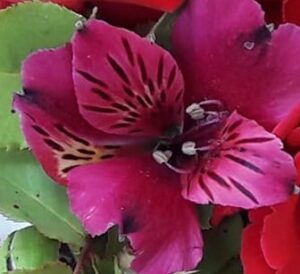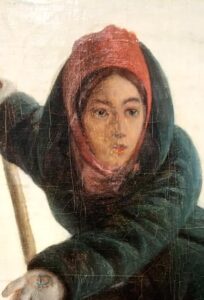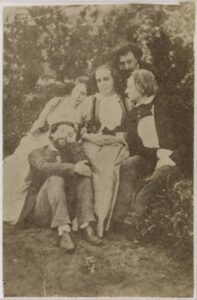HERBACEOUS PERENNIALS
Alstroemeria
Beautiful Alstroemeria are a wonderful cut flower and an excellent garden plant. They are natives of Brazil and Chile. The Alstroemeria became popular in the 20th century, as modern hybrids of the two main species flower profusely in the spring and summer, and the leaves are often evergreen.

Victor Hugo had five children. His first son, Léopold, died as a baby. His surviving children followed at approximately two-year intervals: daughter Léopoldine, his eldest son, Charles, Victor Jr, and last, Adele. Charles and his brother Victor Jr were journalists and writers – Victor had to adopt the name François-Victor to distinguish himself from his father, to avoid the authorities deliberately blaming their father for some incendiary article penned by the son. They were both imprisoned for their beliefs and accompanied their father into exile. In Jersey they were encouraged to take up photography by their father, as part of a family project to publish a travel guide to Jersey illustrated with photographs, which would have been highly innovative had it come about. As a result Francois-Victor published a book, ‘Unknown Normandy’, which includes descriptions of Jersey, and Charles, who travelled to Normandy to take lessons, became an accomplished photographer. His photographs have become justly celebrated for their documentation of the family and its surroundings and for their artistic and technical excellence.
Despite having five children, a series of family tragedies meant that Victor Hugo had only two grandchildren, Jeanne and Georges, by Charles and his wife, Alice Lehaene. On the untimely death of their father, Victor Hugo became their guardian. Georges and Jeanne spent their holidays in Guernsey and inherited both Hauteville House and Juliette Drouet’s house at 20, Hauteville, from their grandfather. They visited often and after Georges’ death Jeanne and their children made Hauteville House over to the City of Paris in 1927. Georges Hugo was a talented writer and a gifted artist, his watercolours and sketches of WWI and those of his grandfather in Guernsey being particularly notable. He served on the Front aged 45 and was awarded the Croix de Guerre. Hugo is a Franco-German surname and anti-German sentiment during the war meant he felt he had to change his name to Georges Victor-Hugo, by which name he is commonly known today. Along with his sister Jeanne his childhood is celebrated in many of Victor Hugo’s later poems and writings. He was the father of the artist Jean Hugo, who attended school in Guernsey. Georges’ first wife, Pauline Menard-Dorian, was a close friend of the Hugo family from childhood; her wealthy socialite parents bought the old house at Icart known as La Marcherie in 1892 as a summer retreat. Here they were visited by Auguste Rodin and other cultural figures. The Nazis destroyed the house in 1944 and it was never rebuilt. François-Victor, an anglophile who had dedicated himself to translating the works of Shakespeare, remained with his father until 1865, when his Guernsey-born fiancée, Emilie de Putron, died. Overcome with grief, he returned to France with his mother the day before her funeral.


Léonie d’Aunet was a mistress of Victor Hugo who meant a great deal to him and whose misfortunes influenced his portrayal of Fantine in Les Misérables. Léonie came from a good family and was married to a talented artist, François Biard, when she met Hugo. Léonie was no ordinary young woman, as at the age of 18 she had insisted on accompanying her future husband on a exploration by ship to Spitzbergen in the far North during which he was to be employed as the resident artist. She was the only woman on the expedition and the first woman to take part in an expedition to explore the Arctic.
Hugo met Léonie in 1843, soon after the tragic death of his daughter Leopoldine. She proved to be more than a distraction; she and Hugo embarked on a seven-year affair, so intense that she requested to separate from her husband. There was a possibility that she and Hugo could have married; she certainly desired that. We will never know what might have been, however, as in 1845 the lovers were discovered together and Léonie arrested for adultery. Hugo escaped censure as he was a peer of the realm. Léonie was imprisoned. She remained incarcerated for 8 months, during which time she was visited in prison by Hugo’s wife, Adèle, perhaps as a proxy for Hugo. Amazingly, he had managed to conceal the whole affair and the scandal from Juliette Drouet, until 1851 when Léonie, hoping that the revelation would cause a split between Hugo and Juliette, sent her Hugo’s letters. Juliette was broken-hearted. However, once again fate conspired to separate the lovers: in 1852 Hugo was exiled from France. His wife Adèle, who had become a good friend of Léonie and who had encouraged her to write for a living, (perhaps to drive a wedge between Hugo and Juliette, or still as a proxy for Hugo himself) dissuaded her from following Hugo to Belgium. Instead, she arranged for Léonie to publish her ‘Letters from Spitzbergen’ in La Revue de Paris. These were to prove very popular. She became a fashion correspondent and saw more literary success. writing a five-act play, Jane Osborne, in 1856 and several popular novels. Victor Hugo felt responsible for Léonie and her children, and he continued to write to her and to support her financially until her death in 1879. Léonie proved an inspiration for Hugo both during and after their affair, and traces of her can be found in poems, in Les Miserables, and in his efforts to better the rights of women. His letters to her have been published.
An exhibition of the work of Léonie’s husband, François Biard, from Paris Musées, has been curated in Paris and is available as a digital tour.



